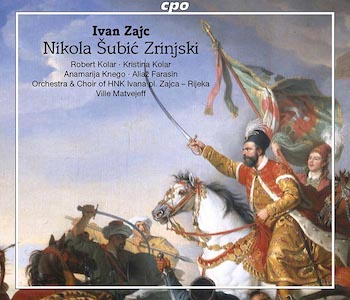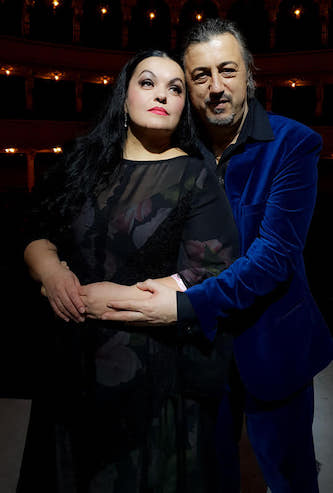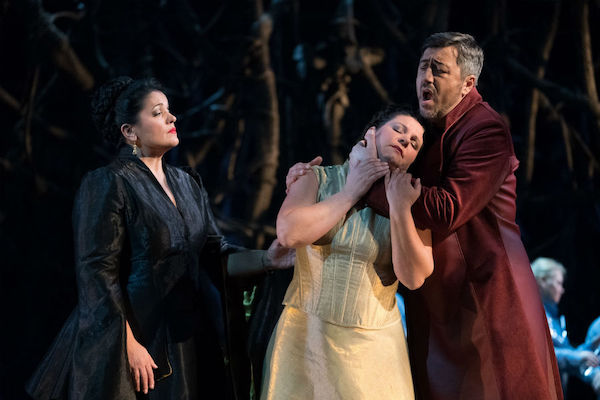Classical Album Review: An Opera by the “Croatian Verdi” — Sung Right
By Ralph P. Locke
The performance shows generally high competence and comfort, no surprise given that the work is a longtime staple in Croatia: indeed, it is the single most-performed opera in the entire repertory of the Croatian National Theater.
Ivan Zayc: Nikola Subic Zrinjski
Kristina Kolar (Eva), Anamarija Knego (Jelena), Aljaz Farasin (Lovro), Robert Kolar (Nikola).
Rijeka Opera Choir and Symphony Orchestra/ Ville Matvejeff.
CPO 555335 [2 CDs] 116 minutes.
Click here to purchase or to hear the beginning of each track.
 How wonderful it can be when opera singers really know the language in which they are singing (and preferably before an audience whose native language it is as well)! I have mentioned this in regard to a number of operas that I have reviewed such as Wagner’s Die Meistersinger (sung in Italian), Wolf-Ferrari’s I quatro rusteghi (sung in German), and one of the best and most involving American operas of the past two decades: Carlisle Floyd’s Prince of Players (based on the Jeffrey Hatcher play from which the movie Stage Beauty was derived).
How wonderful it can be when opera singers really know the language in which they are singing (and preferably before an audience whose native language it is as well)! I have mentioned this in regard to a number of operas that I have reviewed such as Wagner’s Die Meistersinger (sung in Italian), Wolf-Ferrari’s I quatro rusteghi (sung in German), and one of the best and most involving American operas of the past two decades: Carlisle Floyd’s Prince of Players (based on the Jeffrey Hatcher play from which the movie Stage Beauty was derived).
Well, the same is true of operas sung in Croatian, even for this reviewer who knows not a word of the language. I previously reviewed the one Croatian opera that has had an active life outside of its homeland, Ero the Joker, a comic work about love in a village, along the lines of Smetana’s The Bartered Bride. And here comes the first major recording of the other most often-performed Croatian opera, Nikola Šubić Zrinjski, by Ivan Zayc. And, once again, it is performed with a sense of conviction and stylistic rightness that helps the work cross barriers of language and culture. (The translated libretto helps, too, of course!)
Ivan Zajc (sometimes spelled Zaytz; 1832-1914) was the leading figure in Croatian musical life during the late nineteenth century: head of the Zagreb opera house and a professor of piano and voice at the city’s conservatory. He had studied in Milan, and is sometimes called, with local pride, “the Croatian Verdi.”
This is of course nationalistic hyperbole. Now that I’ve heard Nikola Šubić Zrinjski, I’d say that he was highly capable of writing attractive, short-breathed passages and stringing them together but rarely built much dramatic thrust over the span of entire scenes or acts. The music also tends to strike a few of the same moods again and again. I actually like the work, and it held my interest throughout. I just don’t think that excessive praise helps his cause.
This opera is jolly and martial a lot of the time, especially in the many choral and ensemble numbers. In that sense, it resembles much Donizetti and early Verdi. Try the number for the Ottoman troops in CD 1 track 6 (“May Allah protect every step you make!”): stirring stuff, and, interestingly, free of any exotic style-markers.
I warmly recommend Nikola Šubić Zrinjski to people interested in the spread of Western European musical manners and practices (in this case: operatic traditions primarily associated with Italy and France) to the other European lands and to other parts of the world. This whole process is relevant not only to Eastern Europe. The increasing professionalization of musical life in Croatia during what is now called the “Zajc era” — trying to raise musical life to meet international norms, and simultaneously stoking pride in local history and culture—resembles developments occurring around the same time in such places as Norway (with Svendsen and Grieg) and the United States (with such varied figures as Bristow, Paine, Dvorak, Macdowell, Ives, and Chadwick).
The plot of Zajc’s Nikola Šubić Zrinjski derives from a famous German play by Theodor Körner about the Croatian leader Nikola Zrinjski (also known as Miklós VII Zrínyi, because he may well have been Hungarian) and the famous battle of Szigeth (Szigetvár), at which the combined Croatian and Hungarian forces inflicted severe losses on the invading troops from Ottoman Turkey, sufficient to stop their advance on Vienna. It also helped that the sultan, Suleiman the Magnificent, already in ill health, died the night before the battle. (The Ottomans would try again in 1683, besieging Vienna for months until driven back, this time definitively, by multinational forces.)

Singers Kristina and Robert Kolar. Photo: Facebook
The characters are general Nikola Zrinjski, his devoted and equally patriotic wife Eva, their daughter Jelena, her sweetheart Lovro, Sultan Suleiman, and his emissary Mehmed Pasha. (There is also an Ottoman physician, clearly Jewish, named Levi!) The plot is very episodic, as in some other operas based on political and military struggles (e.g., Les huguenots and War and Peace).
Briefly: Jelena and Lovro want to be together, but her father (Zrinjski) persuades Lovro to do his patriotic duty and join the army trying to repel the Ottomans. Sultan Suleiman sends Mehmed to bid Zrinjski to surrender the city. Instead, Zrinjski sets fire to the old city and moves his troops to the new city. Jelena, fearing that she will be tortured or killed by the Turks, asks Lovro to stab her to death, which he does. Her parents, when he tells them, sing: “Oh God, thank you for gently taking her away!”
The Turks invade the new city. The opera ends with a large choral number in which the Croatians urge each other to go to war: “Dying for our homeland, oh, what delight! Fight the foe! He must, must go down.” This number is widely such by Japanese male glee clubs. (Search on YouTube for “Zajc U Boj Japan”.)
As the curtain comes down, we see, in a kind of pantomime, Lovro and Zurinjski fall, fighting. Eva throws a torch into a powder magazine, which causes a huge explosion, and the new city, full of Turkish soldiers, is destroyed.
The performance shows generally high competence and comfort, no surprise given that the work is a longtime staple in Croatia: indeed, it is the single most-performed opera in the entire repertory of the Croatian National Theater (Zagreb). This recording uses the orchestra and chorus of Rijeka, the third largest city in Croatia (known in Italian as Fiume), which was also the city of Zajc’s birth and early career.
The biggest shortcoming is in the roles associated with the two main Ottoman characters. Luka Ortar lacks the many low notes necessary to convey the authority and power of the sultan. The singer listed here as “Giorgio Surian jr.,” singing the role of Mehmed Pasha, is the son of the world-famous Giorgio Surian. I greatly enjoyed the elder Giorgio’s rendering of the comic-bass role in Franz von Suppé’s The Sailor’s Homecoming. The younger Giorgio is not remotely on the same level. His voice is thin and wavers on high notes. These two roles thus come off as pasteboard villains, greatly weakening the work’s dramatic tension between Muslim invaders and Christians defending their homeland.
The two leading roles are taken by what I assume is a married couple: Robert and Kristina Kolar. They sing wonderfully, with richness yet near-total control, often shading their voices to express diverse moods and plot developments. (Oh, how wonderful singers can be when performing in their native language!) The soprano and light tenor who are the young lovers Jelena and Lovro are clean and pure (she always, he most of the time). If you get a chance to hear Anamarija Knego (a native of Rijeka) or Aljaž Farasin (apparently from neighboring Slovenia), don’t miss it! The Rijeka orchestra and chorus seem fully on top of the notes.

A scene from the Rijeka Opera Choir and Symphony Orchestra staging of Nikola Subic Zrinjski.
The booklet contains an informative though somewhat uncritical essay, praising Zajc’s “almost divinely inspired melodic invention.” Without going so far as to invoke heaven, I’d agree that the tunes are often quite good, even memorable.
So, all in all, one can welcome this recording, apparently the work’s first to be widely available. (There was a previous one on a Croatian label, conducted by Milan Sachs.) I can’t help but wonder whether other works by Zajc may be even more effective. He spent 7 years writing and conducting German-language operettas in Vienna and wrote some others in Croatian. His energetic, melodious, good-humored style would seem to suit operetta just fine. Several of his operettas are performed in Croatia (in Croatian, perhaps translated from the German?) but seem not to have been recorded yet.
Zajc also wrote dozens of sacred works, including fully orchestrated masses. (Croatia is, like Hungary and Poland, a majority Roman Catholic country.) Who knows?
Warning: if you’re looking for the recording online, try the composer’s name plus “Nikola.” Even if you try to search for “Subic” (without the accents), the search may fail because the Š within the dealer’s or library’s site displays as a question mark or as some other letter entirely. Librarians call this kind of search strategy a “work-around.”
Ralph P. Locke is emeritus professor of musicology at the University of Rochester’s Eastman School of Music. Six of his articles have won the ASCAP-Deems Taylor Award for excellence in writing about music. His most recent two books are Musical Exoticism: Images and Reflections and Music and the Exotic from the Renaissance to Mozart (both Cambridge University Press). Both are now available in paperback; the second, also as an e-book. Ralph Locke also contributes to American Record Guide and to the online arts-magazines New York Arts, Opera Today, and The Boston Musical Intelligencer. His articles have appeared in major scholarly journals, in Oxford Music Online (Grove Dictionary), and in the program books of major opera houses, e.g., Santa Fe (New Mexico), Wexford (Ireland), Glyndebourne, Covent Garden, and the Bavarian State Opera (Munich). The present review first appeared in American Record Guide and appears here with kind permission.
Tagged: CPO, Ivan Zauc, Nikola Subic Zrinjski, Ralph P. Locke
